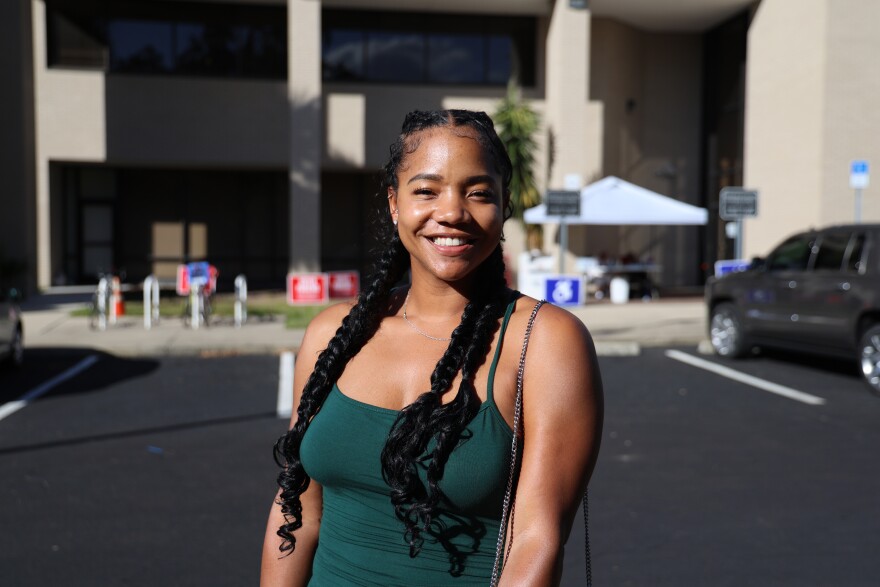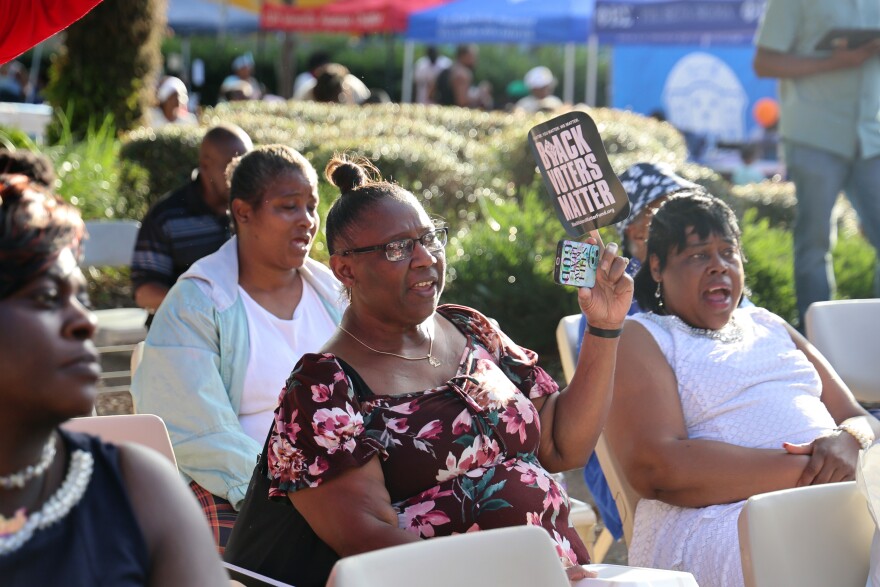GAINESVILLE, Fla. – Black voters – especially men – turned out in low numbers in Florida before Election Day, in a year with a choice between the first female presidential candidate of color and a Republican who has struggled with substantially negative perceptions by Black Americans.
Statewide, 48% of 1.78 million voters who identified as Black submitted mail ballots or visited polling places for early voting, compared to 61% of 8.51 million active white voters, according to a new analysis of government turnout data through the end of early voting Sunday. Among Black men, turnout was even lower at 44%, seven percentage points lower than Black women.
The 48% compares to 60% of Black voters who voted by mail or voted early at this point in 2020. Voting by mail among Black voters was down 50% since the last presidential election. About 70% of eligible Black voters cast a ballot four years ago, including voting on Election Day, according to state elections records.
The new figures include voting from Sunday, when churches in many counties across Florida conducted Souls to the Polls events to encourage civic participation. The analysis of real-time turnout data was conducted by Fresh Take Florida, a news service of the University of Florida College of Journalism and Communications.
In none of Florida’s 67 counties were Black voters casting early or mail ballots at the same rate as white voters. In largely white Sumter County in central Florida, white voters were turning out over Black voters by more than 30 percentage points. In nearby rural Hardee County, only about one-in-four Black voters had cast a ballot – compared to 48% of white voters.
Even in Gadsden County near Tallahassee, Florida’s only county with a majority Black population, turnout among Black voters was more than 13 points behind white voters.

In large urban areas, too, Black voter turnout also was low:
- In Miami-Dade and Broward counties, Black turnout lagged behind white voters by 13% and 8%.
- In Hillsborough and Pinellas counties, Black turnout lagged behind white voters by 12% and 16%.
- In Orange and Osceola counties, Black turnout lagged behind white voters by 11% and 10%.
- In Duval and St. Johns counties, Black turnout lagged behind white voters by 12% and 11%.
It wasn’t clear whether there would be a surge among Black voters on Election Day, but there was no clear evidence for this. Some young voters do prefer to vote on Election Day, and young voters tend to be more diverse in Florida than older voters.
“A lot of Black voters may wait to Tuesday, but I think there's been a substantial push to get out the early vote,” said Aaron Carter, 68, of Gainesville, a longtime member of the Black fraternity Kappa Alpha Psi. “It's important that we get out the youth vote, but youth voters typically wait until the last, last minute to vote for whatever reason.”
The figures so far bode poorly for Democrats' hopes that Vice President Kamala Harris – and former President Donald Trump's history with race – would energize Black voters across Florida this year and help stanch the Republican hold on so many downstream offices statewide.
In interviews, Black voters said they wrestled with questions about whether their ballots mattered in a state where Republicans outnumber Democrats by more than 1 million voters and where Trump was consistently projected in pre-election polls to win Florida’s 30 electoral votes easily. The GOP also holds majorities in the state House and Senate, 20 of Florida’s 28 congressional seats and every statewide elected office, including the governor’s seat.
Morgann Robinson, 31, of New Smyrna Beach, a clinical pharmacist, said her colleagues don’t believe their votes matter. She described the election as murkier than others, with President Joe Biden’s late withdrawal as the Democratic nominee and what she said was slanderous campaign rhetoric. She and her boyfriend both voted early.
“People die to make sure that we have these rights,” Robinson said. “If you don't like the policies that go into play, you can only look in the mirror and face the fact that you didn't use your voice.”

Black residents who had already voted – interviewed as they walked out of polls this weekend – said they were motivated in this election by racist insults from speakers at a recent Trump rally in New York and by Trump questioning Harris’ racial identity earlier in the campaign.
“You can tell when someone's joking, and usually when they joke, they say, ‘Hey, you know I’m only kidding’ at the end,” said Rudolph Rolle, 54, a bartender in Orlando. “These people truly feel the way they feel, and they feel like they have a right to say it.”
Rolle registered as a Democrat in January and was voting for the first time, according to state records.
A college student in Miami, Malik Dorleus, 27, also cited racist comments about Black and Hispanic voters at Trump’s rally in New York last month as motivating him to vote for Harris. He described the vice president as better equipped on foreign policy, too.
“I would like a leader of the free world who actually understands how the free world operates, and who actually shows that they have an understanding of not just national law, but international law as well,“ Dorleus said.
Jammal Carlton, 27, of Bowling Green, who is registered as a Black voter, said he has been too busy to vote yet. He wondered how many Black voters in his community might be ineligible because of felony convictions and overdue court fines and fees.
“I think a percentage of voters that are Black African Americans that do live in Hardee County, maybe they are not eligible to vote,” Carlton said. “Or they just don't want to because they feel like, even if they do vote, it may not make a difference or change, especially coming from where they come from.”
Florida changed its rules after 2018 to allow people convicted of felonies to vote but required them first to pay court fines and fees before they are eligible. The process to determine whether a defendant still owes money can be complex, and some voters have been arrested and prosecuted over what they said was confusion over whether they could legally vote. That has discouraged some from even trying.
“You're seeing people that are more hesitant, people that are unsure,” said Desmond Meade, executive director of Florida Rights Restoration Coalition.

Black voters also said redistricting has frustrated them and hurt their representation in Florida.
Gadsden County was in Florida's 2nd Congressional District redrawn by Gov. Ron DeSantis in 2022 so that African Americans no longer made up enough of the constituency to elect their preferred candidate. Republican Neal Dunn beat incumbent Democratic Rep. Al Lawson, who is Black, in the election that same year and was expected to win re-election easily this week.
The turnout figures so far also explain former President Barack Obama's admonition to Black voters last month in Pennsylvania that, "we have not yet seen the same kinds of energy and turnout in all quarters of our neighborhoods and communities." He added, "You are thinking about sitting out?” Obama especially chided Black men for not supporting Harris.
LaVon Bracy, 76, a Florida voting rights activist with the group Faith in Florida and mother of state Rep. LaVon Bracy Davis, D-Orlando, said she hasn’t witnessed such an ugly election with so much vitriol and misinformation in her lifetime. She said Black voters are motivated, despite the challenges in registering them and encouraging them to vote.
“In some aspects, some are motivated,” Bracy said. “In other aspects, people are just saying, ‘if casting a vote is going to be this difficult, I just won't be a part of the process.’”
___
This story was produced by Fresh Take Florida, a news service of the University of Florida College of Journalism and Communications. The reporter can be reached at diego.perdomo@freshtakeflorida.com. You can donate to support our students here.

